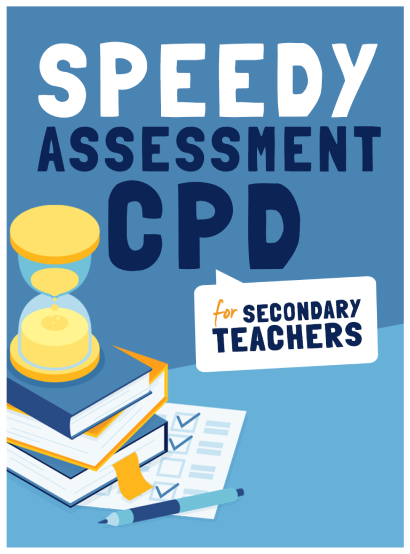Are you teaching a 5-year GCSE?

Testing young people on knowledge they haven’t yet been taught is both pointless and unethical, says JL Dutaut – but it’s not hard to see why it happens…

- by JL Dutaut

As I started writing this piece, my son’s fourth report this academic year dropped through the letterbox. That was 30 seconds ago. That’s all the time I’m giving it. That’s all the time it deserves.
I feel sorry for my colleagues made to fill in the spreadsheets that generate these reports, but I feel even sorrier for all the parents out there trying in good faith to make sense of them.
They might as well be reading tea leaves for all their diagnostic and prognostic power. I feel sorrier still for the children of these parents.
It’s not just the reports but the diet they’re a record of that is troubling. Each row of the table is a subject for all the world equal to all the others, in alphabetical order and devoid of hierarchy, testament to a broad and balanced curriculum.
In the next column are the numbers, and as sure as eggs is eggs, those for English, maths and science are higher than those for French, music and drama. Dissonance beyond words.
“Why aren’t you making more progress in drama, son?” “What is your French teacher doing wrong? Why is your target grade so low?” These are conversations that don’t happen in my house. We only look at effort grades.
We used to look at comments, but it seems these have been sacrificed to the gods of workload. Arse about face much?
Simple maths
As long as he’s trying his hardest, we’re proud of him. If effort dips, a conversation will be had. Perhaps the ominousness of that conversation is sufficient.
Perhaps he’s naturally what his younger brother might call “a sweaty try-hard”. Perhaps it’s the trust and support. Whatever it is, he’s never failed to make the effort, and he’s never failed to make progress.
Until a fortnight ago, in fact, everything was rosy at secondary school. And then the Year 9 maths assessment came. Students were told results would determine sets for GCSE.
Worse, they were told GCSE classes were taught proportionately less of the curriculum as they moved down the sets. Stop. What?
A,B,C. Easy as 1,2,3.
None of this was shared with me. My son didn’t mention it, but spent a weekend revising, seemingly quite relaxed.
Monday evening came and, expecting the usual, unenlightening “It was fine,” in answer to the equally inane “How was school today?”, I found myself instead confronted with a young man exhibiting all the signs of panic.
“I failed the maths test. I’m going to end up in a bottom set, and I’m never going to recover because they won’t teach me the whole curriculum. I won’t get to do what I want at university.”
A barely restrained cascade of emotions was in his eyes as a tentatively imagined future collapsed, Armageddon-like, somewhere behind them. Every question made his panic peak again.
Impossible challenge
The assessment, it turns out, was a full GCSE paper.
Every assessment since Year 7 has been composed of GCSE questions and to an extent, that’s fine provided they’re pitched at the students’ level of understanding, but this?
Not one, but three full GCSE papers over the period of a week, including the questions on the parts of the curriculum they haven’t been taught.
Is that supposed to build character? To let them experience what the test paper will look and feel like to those in the bottom sets in two years’ time? To prepare them for hunting for jobs that haven’t been invented yet?
It is the height of irresponsibility. A dire lack of professionalism and a shocking lapse of ethical practice.
My son’s panic is as nothing to the depths of despair others feel, and probably have felt since Year 7.
Is it any wonder children want to quit the subject, and effectively do long before they’re allowed to?
Is it any wonder teachers learn to accept this as normal, and that we perpetuate ideas of Aptitude, Behaviour and Character when we labour under the same pressures?
With the BBC publishing an article recently that asks “What’s the right age to quit maths?”, it’s surely time we went back to our ABCs and started again.
Market equals inequity
I don’t blame the school. Other teachers and leaders on social media are convinced I can and should.
After all, their curriculum is rich, carefully planned and doesn’t induce fear or stress in teachers or students, so why should anyone else’s? I hear this, and it sounds like privilege.
The research is clear. Market mechanisms do not improve education. From above looking down or outside looking in, it might look like they do, but without fail they mask growing inequalities.
When schools are in competition with each other, every success comes at the expense of a failure. It’s maths.
Wherever such competition is tried, the consequences are the same.
The US, Sweden, Chile, Australia, New Zealand, El Salvador, Brazil. The list goes on.
Increased inequality, exclusions and segregation, cheating, gaming and unethical behaviours, student and teacher stress, and recruitment and retention problems.
Narrowing curriculum. Deprofessionalisation of teaching. The more punitive the accountability, the worse the effects, and the most vulnerable always suffer the worst.
System failure
To expect my son’s teachers to buck those trends is to expect something my community is not ready to do. Bully for you if yours is.
Ofsted may now be placing more focus on curriculum and less on data, but it ought to have been the entirety of a school’s work the whole time. The only reason it hasn’t been so is Ofsted in the first place.
They can kill the three-year GCSE, but it won’t matter, because the five-year GCSE is already the new normal.
You can put it down to Aptitude, but that sounds like a hard bigotry of high expectations to me.
You can put it down to Behaviour, but that seems like a cop out from dealing with the environment.
You can put it down to Character, but a resilient system is surely one that asks less of the resilience of its members.
Until we do accountability differently, this is our lot.
Until teachers and leaders, especially those privileged in our current system, are quicker to understand and support than to blame and shame, teachers will keep filling spreadsheets full of false data and modelling the system in their classrooms, and parents will keep getting meaningless reports and fielding their children’s anxieties.
And they’ll keep blaming each other.
The problem isn’t the tests. The problem is that the test is all there is, and that’s what trickles down.
Assessing ethically: Dos and don’ts for leaders
- DO have an assessment week if it simplifies things for teachers and students.
- DON’T have an assessment week if it just simplifies things for you.
- DO factor in realistic timeframes for marking work.
- DON’T plan half-term weeks as ‘recovery time’.
- DO communicate progress with parents.
- DON’T rely on numbers alone to do that.
- DO create a whole-school system to capture progress and attainment.
- DON’T incentivise teachers to hide the fact that progress is messy.
- DO cut teachers’ workload, with a view to keeping only what is valuable.
- DON’T think of work simply as a list of tasks for accountability.
JL Dutaut is the editor of Flip the System UK: A Teachers’ Manifesto, published by Routledge. He is currently on a career break from teaching to research school accountability systems worldwide. He’ll let you know when he’s found a good one. JL tweets as @dutaut.











